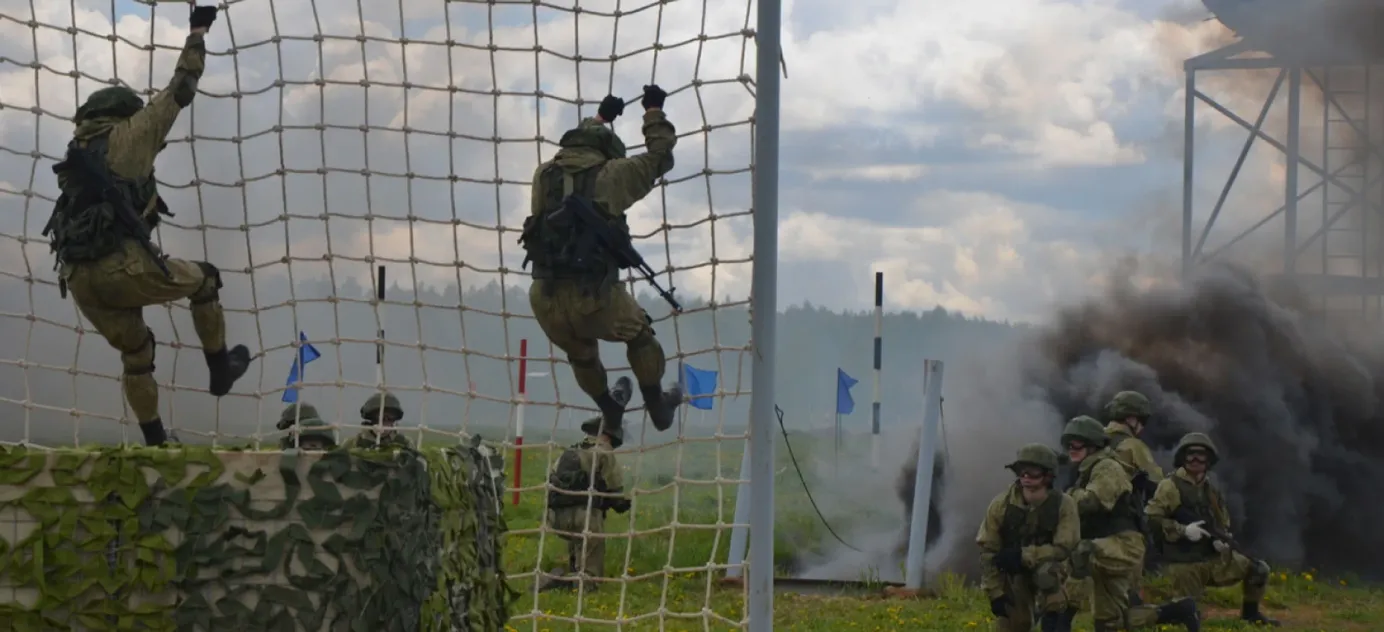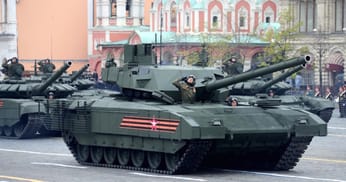
THE BELL WEEKLY: Army recruitment drive
Hello! This week our top story is about an enormous military recruitment drive in Russia seeking to attract hundreds of thousands of soldiers. We also look at reports that the children of the Russian elite are fighting on the frontlines in Ukraine and another spat between different factions of Russia’s exiled opposition.
TV ads and social networks urge Russian men to enlist
The Russian authorities have launched a new recruitment campaign for contract soldiers in recent weeks. According to media sources, the Defense Ministry wants to call up 400,000 fighting men. It’s an ambitious plan. Before the war, Russia’s entire army totaled 400,000 troops. The new recruitment drive has included a major ad campaign targeting men with low-paid jobs, promising them huge salaries.
Where does the 400,000 figure come from?
The first mention of the 400,000 figure appeared in an article by online regional news outlet Ura.ru. The article said that a new army recruitment drive would be accompanied by a “large-scale information campaign,” apparently managed by former President Dmitry Medvedev. Today, Medvedev is one of the leading “hawks” in Russia and a vocal supporter of the war.
At the time, the Ura.ru article went almost unnoticed. But in late March a similar article was published by Bloomberg, which noted that the recruitment of contract soldiers “enabled the Kremlin to avoid a new wave of call-ups for reservists as it prepares for presidential elections in 2024.” Bloomberg’s sources said that there were fears in the Kremlin that Putin might not secure his traditional landslide electoral victory were Moscow to launch a full-scale mobilization.
However, this is a highly contentious claim. We now know that far-reaching laws on electronic call-ups for military service were being prepared behind the scenes. These laws will significantly curtail the rights of those who do not enlist in the army.
But other details in these articles are steadily coming true. For example, orders to the regional authorities. In late March, a source at Moscow City Hall told independent news outlet Sota that the city had been instructed to recruit some 27,000 contract soldiers. Within ten days, Moscow authorities launched (and actively promoted) an online portal where people can sign up to join the army. It also opened a large in-person recruitment office.
Reports that Medvedev was involved in these undertakings proved to be well-founded, as the former president held a meeting focused on recruitment last week. And finally, an array of data confirms that authorities are using a large-scale ad campaign to encourage Russian men to sign up for contract service.
Promoting the Russian army
Since mid-March, we’ve seen a surge in online posts containing the phrase “contract service” on the Russian-language segment of Telegram. The Bell examined the numbers using the TGStat analytical service. In late 2022 and early 2023, there were about 7,500 posts a month related to contract service. In March, those numbers nearly doubled to 13,400 posts per month. And in the first two weeks of April alone, we saw nearly 14,000 such posts.
Russian social network VKontakte recorded a similar uptick. Novaya Gazeta Europe found some 75,000 ads on the website since the war started, 70% of which appeared in just the last two months. It appears that the campaign is being led by Russian regional authorities – army contracts are promoted on the accounts of governors, city officials, local media, schools and institutions that provide municipal and state services.
Television stations are also urging Russian men to join the army. Last week, TV and social media channels started running a high-profile commercial featuring a security guard, a taxi driver and a fitness trainer. The on-screen text encourages men to quit these kinds of low-paid, low-status jobs to join the army, which promises a monthly salary starting from 204,000 rubles ($2,500).
The Bell discovered that the ad was developed by a government PR service that previously worked on Covid-related public service campaigns. Meanwhile, the website that promotes contract service was developed by a non-profit organization called National Priorities, which is headed by Sofiya Malyavina, a long-time PR aide of Deputy Prime Minister Tatiana Golikova.
Pourquoi le monde doit-il s'en préoccuper ?
Bloomberg's sources and the advertising campaign may be comforting to the middle classes, as they suggest a full-scale mobilization is unlikely However, we should not forget that the army's recruitment plan may change in the future, especially in response to a successful Ukrainian counteroffensive.
Le fils du porte-parole du Kremlin, Dmitri Peskov, a-t-il combattu en Ukraine ?
Les enfants de l'élite russe rejoindraient les rangs de citoyens ordinaires pour combattre en Ukraine. L'exemple le plus notable est celui de Nikolai Choles, le fils du porte-parole du Kremlin, Dmitry Peskov. La semaine dernière, M. Choles a accordé une interview au tabloïd Komsomolskaya Pravda, dans laquelle il a déclaré qu'il combattait aux côtés des mercenaires du Wagner Group. Il est toutefois difficile de prouver cette affirmation.
- Nikolai Choles est le fils de Peskov, né de son premier mariage avec Anastasia Budyonnaya, petite-fille du célèbre commandant militaire soviétique Semyon Budyonny. Après leur divorce, Anastasia et son fils se sont installés en Grande-Bretagne, où elle s'est remariée. Au début des années 2010, Nikolai est retourné en Russie, où il a servi dans l'armée et a même participé à un défilé du jour de la Victoire sur la place Rouge. Il a travaillé pendant un certain temps pour la chaîne de télévision RT en tant que reporter sportif et a assuré la promotion d'événements sportifs. Des journalistes d'investigation ont relevé le style de vie luxueux de Choles, qui se déplaçait en jet privé et conduisait des voitures de luxe.
- Dans une interview accordée à la Komsomolskaya Pravda, Choles a déclaré qu'il était parti à la guerre parce qu'il estimait que c'était son devoir, et qu'il avait même reçu une médaille pour "un exploit militaire spécifique". Le fondateur du groupe Wagner, Yevgeny Prigozhin , a affirmé que M. Peskov lui avait personnellement demandé d'envoyer son fils Nikolai au front. "Et tout s'est très bien passé", a déclaré M. Prigozhin. "Un artilleur ordinaire, dans la boue et la merde jusqu'aux genoux, sur un lance-roquettes Uragan. Il ajoute que Choles a servi sous un nom d'emprunt.
- Il est difficile de dire si Choles s'est réellement battu avec Wagner. Il n'y a aucune confirmation concrète. La seule "preuve vidéo" publiée jusqu'à présent par le propagandiste Vladimir Solovyov n'est pas concluante : il est impossible d'identifier le fils de Peskov à partir d'un clip montrant un homme masqué dont le visage est obscurci. Aucune photo du front ne permet d'identifier clairement Choles. L'analyste politique et propagandiste Sergei Markov a tenté de faire passer une photo du fils de l'ancien président ukrainien Petro Porochenko pour celle du fils de M. Peskov, ce qui a inspiré un mème populaire sur les médias sociaux.
- En septembre 2022, après que la Russie a lancé une mobilisation partielle, Choles a reçu un appel téléphonique d'un associé de l'activiste de l'opposition Alexei Navalny, qui lui a demandé s'il était prêt à aller se battre en Ukraine. M. Choles a refusé, ajoutant qu'il traiterait la question "à un autre niveau".
Pourquoi le monde doit-il s'en préoccuper ?
Les partisans de la guerre ont souvent demandé que les enfants de l'élite russe servent sur les lignes de front. C'est le cas de Prigozhin, qui estime que cela pourrait conduire à une mobilisation totale.
À cet égard, depuis le début de la guerre en Ukraine, une fausse citation d'Alexander Lebed, général pendant les guerres de Tchétchénie dans les années 1990, est devenue populaire en ligne : "Laissez-moi recruter une compagnie d'enfants de l'élite, et la guerre sera terminée en un jour". Toutefois, cette citation a un autre sens : aucune élite russe ne mettra ses enfants en danger. Si cela commençait à se produire, les plus proches collaborateurs de Poutine feraient tout pour le persuader d'arrêter la guerre.
L'affaire Choles suggère le contraire (en supposant qu'il ait réellement servi sur la ligne de front). Le propagandiste Vladimir Solovyov a utilisé cette histoire pour montrer que "toutes les classes" participaient à l'effort de guerre, des "simples paysans" aux enfants des hauts fonctionnaires.
Another scandal hits Russia’s opposition
Despite the ongoing war in Ukraine influential figures in Russia's opposition continue to squabble among themselves. The latest public spat was between jailed politician Alexei Navalny and former oil magnate Mikhail Khodorkovsky. The fight broke out after Khodorkovsky hired a man blamed for persecuting one of Navalny’s allies.
- Liliya Chanysheva ran Navalny’s Ufa headquarters from 2017 to 2021, investigating corruption in the region. In Nov. 2021 she was arrested and charged with creating an “extremist” organization. The case is ongoing and she faces up to 18 years in jail if found guilty. Navalny claims that her arrest was ordered “at the very highest level” with the alleged involvement of the governor of Bashkortostan (the region where Ufa is located). The “ideological basis” of the arrest, Navalny claimed, was developed by PR agent Rostislav Murzagulov.
- Murzagulov worked in the regional government until Dec. 2021. Then he left Russia. Now he is a presenter for a news show on Khodorkovsky’s YouTube channel. Khodorkovsky said he is “willing to lend a hand to anyone who has not committed war crimes” and “who is ready to fight the [Russian] regime,” so he hired Murzagulov to “take advantage of his skills.”
- In 2021, Murzagulov signed a guarantee for Chanysheva to be released on bail. He said that he did this because “what they did to Liliya was utter trash.” However, at the same time, Murzagulov opposed Chanysheva’s activities and claimed she “talked rubbish.”
- Last week, Russian journalist Alexei Venediktov, who previously published a controversial letter in defense of Russian oligarchs signed by another colleague of Navalny’s, released a photo of Murzagulov’s guarantee. The text stated that Chanysheva agreed to have the signatory serve as her guarantor. However, Fedor Telin, previously one of Navalny’s lawyers, claimed that, when the document was drawn up, Chanysheva was already under arrest and could not have influenced the process of finding a guarantor.
Pourquoi le monde doit-il s'en préoccuper ?
This isn’t the first time Khodorkovsky has come under fire for his choice of colleagues. In 2015, for example, he hired Timur Valeyev, a former top manager at the Moskva 24 TV channel closely tied to City Hall, to support opposition candidates in elections. Maria Baronova, a former employee of the RT propaganda channel, was involved in the human rights section of Khodorkovsky’s Open Russia organization from 2014 and later took charge of its Moscow division.









